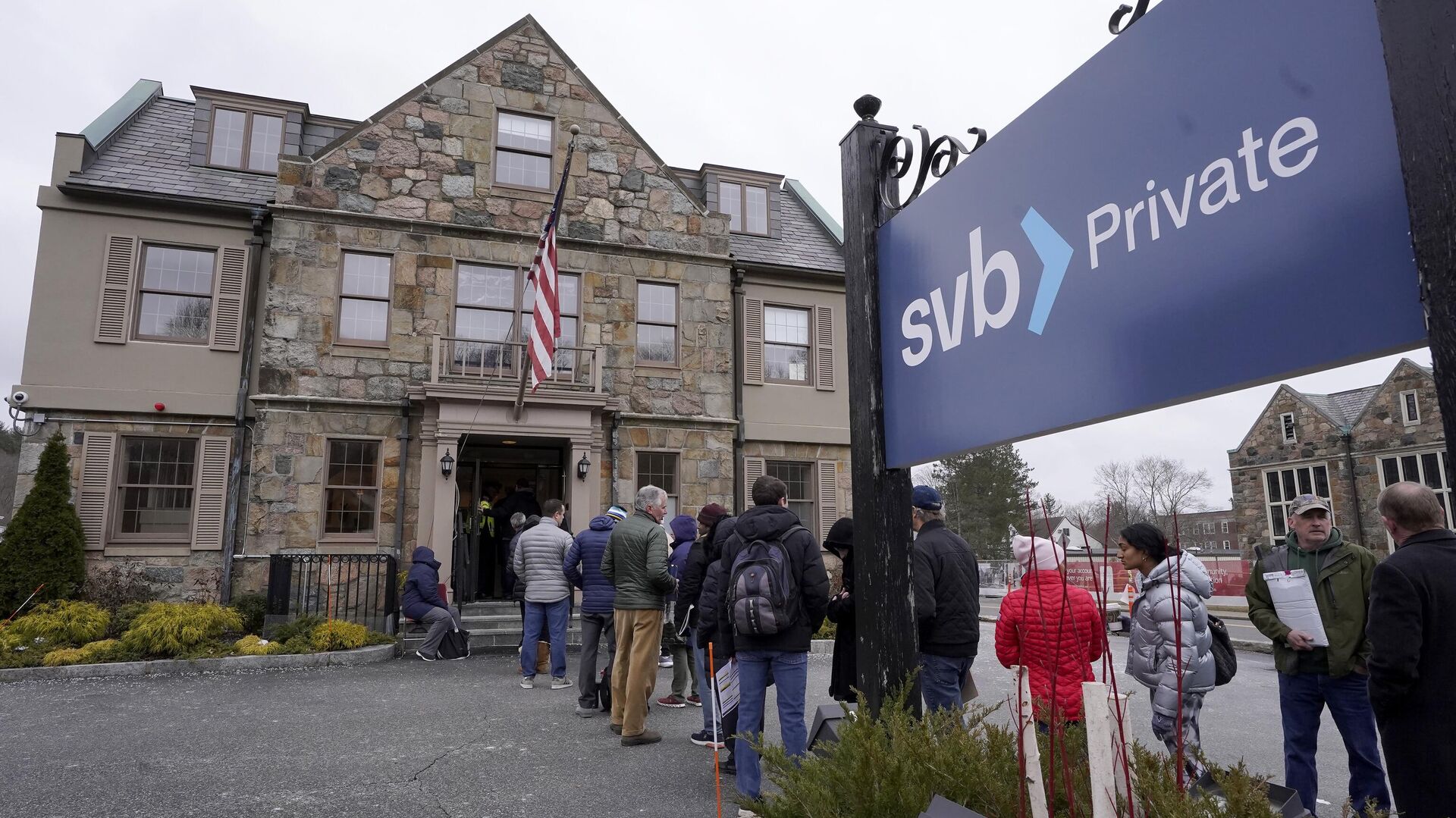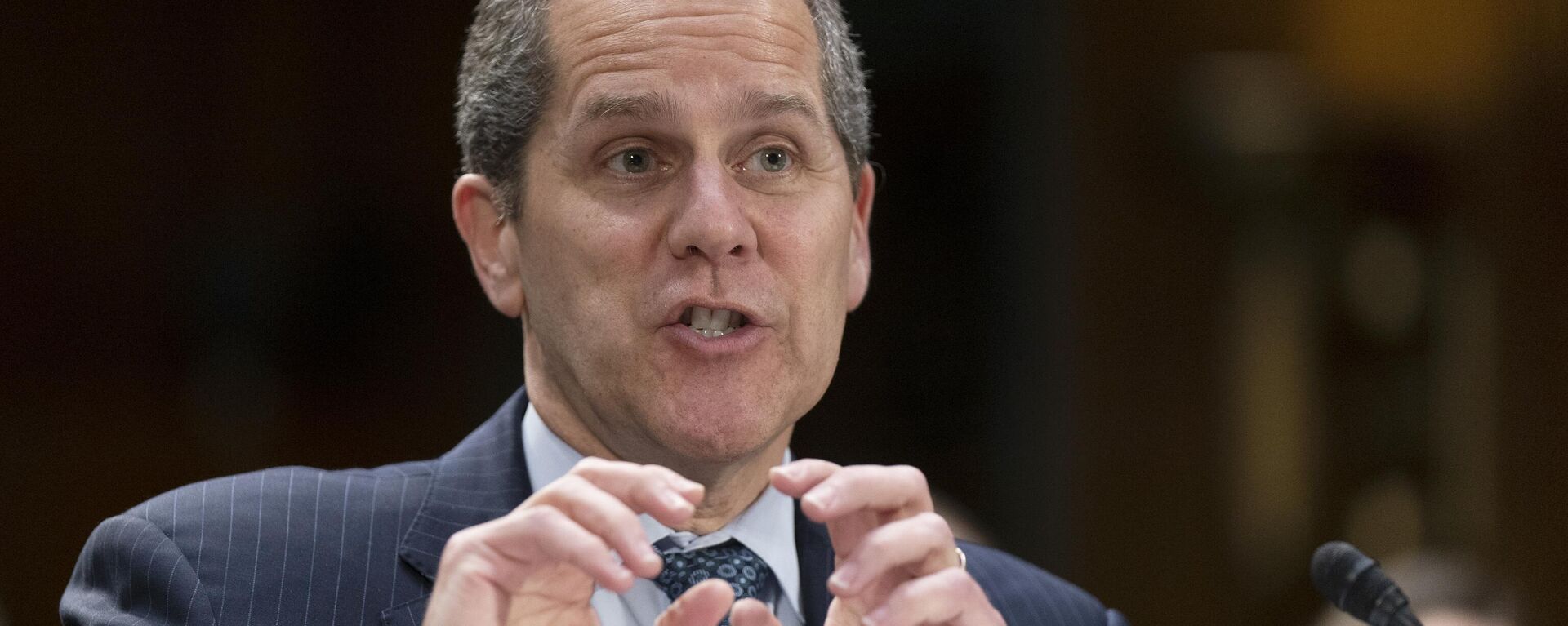https://sputnikglobe.com/20230329/us-banking-system-could-suffer-more-shocks-as-consumer-confidence-plummets-1108923548.html
US Banking System Could Suffer More Shocks as Consumer Confidence Plummets
US Banking System Could Suffer More Shocks as Consumer Confidence Plummets
Sputnik International
The aftershocks from the Silicon Valley Bank insolvency are still being felt across the US finance sector. David Tawil argues that while the system may not be on the verge of collapse, a crisis in confidence could sink more banks.
2023-03-29T15:59+0000
2023-03-29T15:59+0000
2023-03-29T15:59+0000
us
fault lines
silicon valley bank collapse
credit suisse group ag
bailout
us congress
us federal reserve
economy
https://cdn1.img.sputnikglobe.com/img/07e7/03/0f/1108419606_0:161:3071:1888_1920x0_80_0_0_42609e9689f82b3edb2d1efdc8d5d3dc.jpg
The US banking sector is not fatally flawed, but could see more shocks if trust in institutions is not restored.Asked whether the collapse of Silicon Valley Bank closely followed by two others was a symptom of a deeper crisis in the US financial system, David Tawil told Sputnik there were "challenges facing the banking industry.""In the wake of all that has happened, there is scepticism on behalf of depositors and investors," he stressed. Secondly, "the very rapid rise in interest rates over the past year has made it challenging, to say the least, for banks to go ahead and maintain value in the investments that they put depositors money in," he added.Banks profit by making loans with their depositors' money, charging a higher interest rate than they pay out. In the US, many of those loans are to the federal government in the form of securities or treasury bonds.But with the federal reserve raising interest rates in a bid to control rising inflation — a result of the COVID-19 crisis and sanctions on Russia — bonds issued in previous years are worth less than their purchase price since they have a lower interest rate 'yield'.While there was no "collapse around the corner", the federal government and the finance sector were still "very concerned", the finance expert said.But one risk for banks is that depositors may decide to withdraw their cash and invest in a "money market fund" backed by government securities which currently yield five or six per cent annually."They're as liquid and you don't have to worry about bank risk," Tawil points out. "At the end of the day, you're earning zero at the bank. So why would you do that? "t's less about fear of banks and it's more about just dollars and cents."Asked whether the finance sector needed more regulatory oversight, the investment guru said: "I don't think we need more policemen. We need the current policemen doing their jobs."For more in-depth analysys, check out Fault Lines.
https://sputnikglobe.com/20230328/irresponsible-not-to-fix-us-banking-after-crisis---fed-supervisory-chief-1108885025.html
Sputnik International
feedback@sputniknews.com
+74956456601
MIA „Rosiya Segodnya“
2023
James Tweedie
https://cdn1.img.sputnikglobe.com/img/07e4/08/1c/1080307270_0:3:397:400_100x100_80_0_0_7777393b9b18802f2e3c5eaa9cbcc612.png
James Tweedie
https://cdn1.img.sputnikglobe.com/img/07e4/08/1c/1080307270_0:3:397:400_100x100_80_0_0_7777393b9b18802f2e3c5eaa9cbcc612.png
News
en_EN
Sputnik International
feedback@sputniknews.com
+74956456601
MIA „Rosiya Segodnya“
Sputnik International
feedback@sputniknews.com
+74956456601
MIA „Rosiya Segodnya“
James Tweedie
https://cdn1.img.sputnikglobe.com/img/07e4/08/1c/1080307270_0:3:397:400_100x100_80_0_0_7777393b9b18802f2e3c5eaa9cbcc612.png
us, silicon valley bank, collapse, bailout, us congress, federal reserve bank
us, silicon valley bank, collapse, bailout, us congress, federal reserve bank
US Banking System Could Suffer More Shocks as Consumer Confidence Plummets
The aftershocks from the Silicon Valley Bank insolvency are still being felt across the US finance sector and overseas. David Tawil, co-founder of ProChain Capital, argues that while the system may not be on the verge of collapse, a crisis in confidence could sink more banks.
The US banking sector is not fatally flawed, but could see more shocks if trust in institutions is not restored.
Asked whether the collapse of Silicon Valley Bank closely followed by two others was a symptom of a deeper crisis in the US financial system,
David Tawil told Sputnik there were "challenges facing the banking industry."
"In the wake of all that has happened, there is scepticism on behalf of depositors and investors," he stressed.
"Banking is a business of trust," Tawil pointed out. "You only have your money at a bank with the full faith that if you need your money, you could be able to get it. And that trust has taken a severe knock over the past couple of weeks."
Secondly, "the very rapid rise in interest rates over the past year has made it challenging, to say the least, for banks to go ahead and maintain value in the investments that they put depositors money in," he added.
Banks profit by making loans with their depositors' money, charging a higher interest rate than they pay out. In the US, many of those loans are to the federal government in the form of securities or treasury bonds.
But with the federal reserve raising interest rates in a bid to control rising inflation — a result of the COVID-19 crisis and
sanctions on Russia — bonds issued in previous years are worth less than their purchase price since they have a lower interest rate 'yield'.
"Therefore, those banks now have challenged balance sheets where their investments don't necessarily equal or exceed by a large amount deposits," Tawil explained. "And so depositors rightfully are concerned that if they want to get my money out, if I'm the last in line, there's not going to be any money left for me."
While there was no "collapse around the corner", the federal government and the
finance sector were still "very concerned", the finance expert said.
But one risk for banks is that depositors may decide to withdraw their cash and invest in a "money market fund" backed by government securities which currently yield five or six per cent annually.
"They're as liquid and you don't have to worry about bank risk," Tawil points out. "At the end of the day, you're earning zero at the bank. So why would you do that? "t's less about fear of banks and it's more about just dollars and cents."
Asked whether the finance sector needed more regulatory oversight, the investment guru said: "I don't think we need more policemen. We need the current policemen doing their jobs."
"Congress is not helping here, holding hearings and yelling at people," Tawil said. While that made "great grandstanding for those congresspeople, especially those that are seeking re-election," ultimately "they've failed us."
For more in-depth analysys, check out Fault Lines. 





